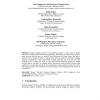Free Online Productivity Tools
i2Speak
i2Symbol
i2OCR
iTex2Img
iWeb2Print
iWeb2Shot
i2Type
iPdf2Split
iPdf2Merge
i2Bopomofo
i2Arabic
i2Style
i2Image
i2PDF
iLatex2Rtf
Sci2ools
108
click to vote
ECCE
2007
2007
Intelligent decision support in medicine: back to Bayes?
: Decision Support Systems are proliferating rapidly in many areas of human endeavour including clinical medicine and psychology. While these are typically based on rulebased systems, decision trees, or Artificial Neural Networks, this paper argues that Bayes' Theorem can be applied fruitfully to support expert decisions both in dynamically changing situations requiring the system progressively to adapt, and when this is not the case. One example of each of these two types is given. One provides diagnostic support for human decision makers; the other, an e-health mental intervention system provides decision rules enabling it to respond and provide the most appropriate training modules to input from clients with changing needs. The contributions of psychological research underlying both systems is summarized.
Decision Support Systems | Decision Trees | ECCE 2007 | Human Computer Interaction | Human Decision Makers |
Related Content
| Added | 14 Aug 2010 |
| Updated | 14 Aug 2010 |
| Type | Conference |
| Year | 2007 |
| Where | ECCE |
| Authors | Gitte Lindgaard |
Comments (0)

